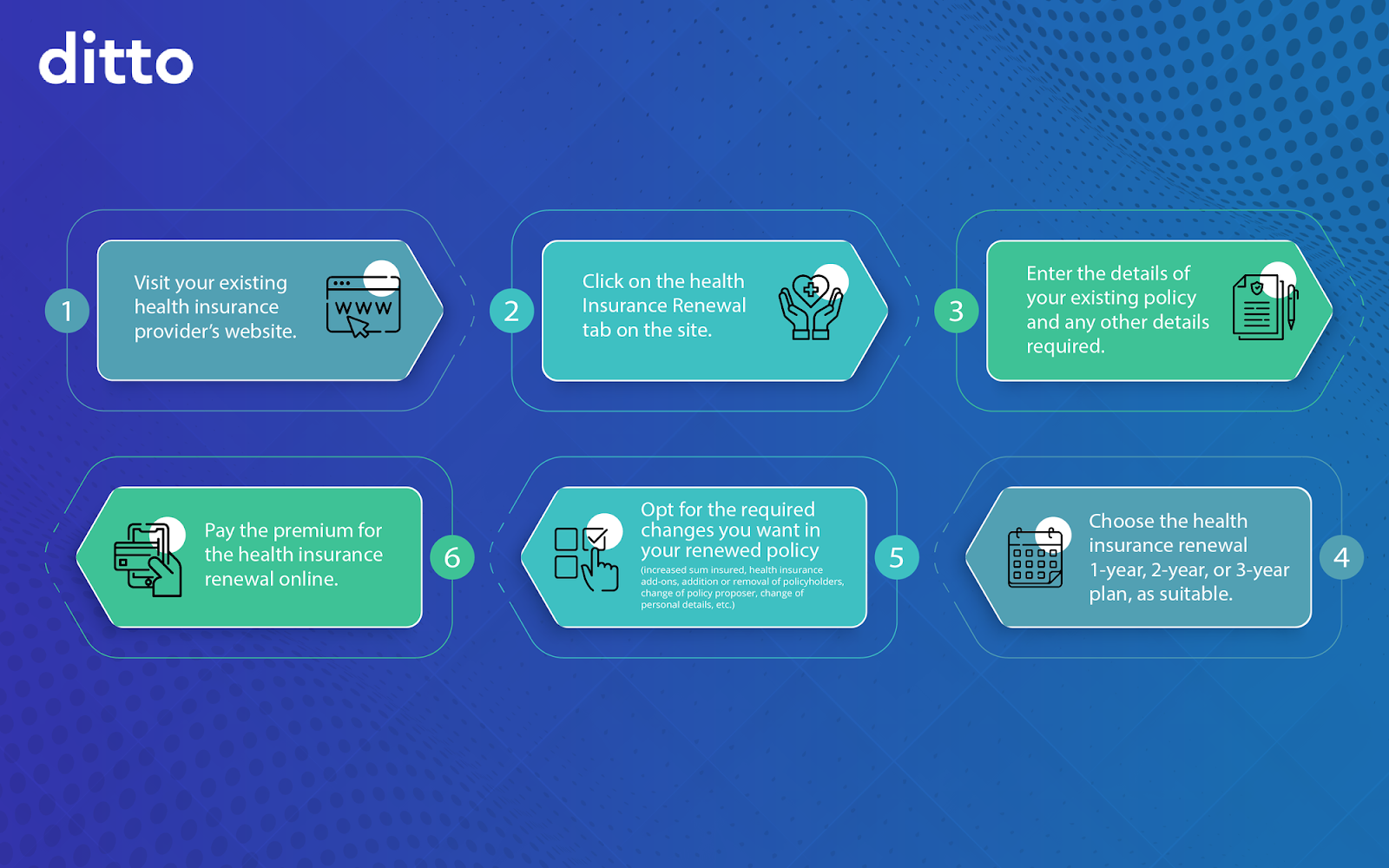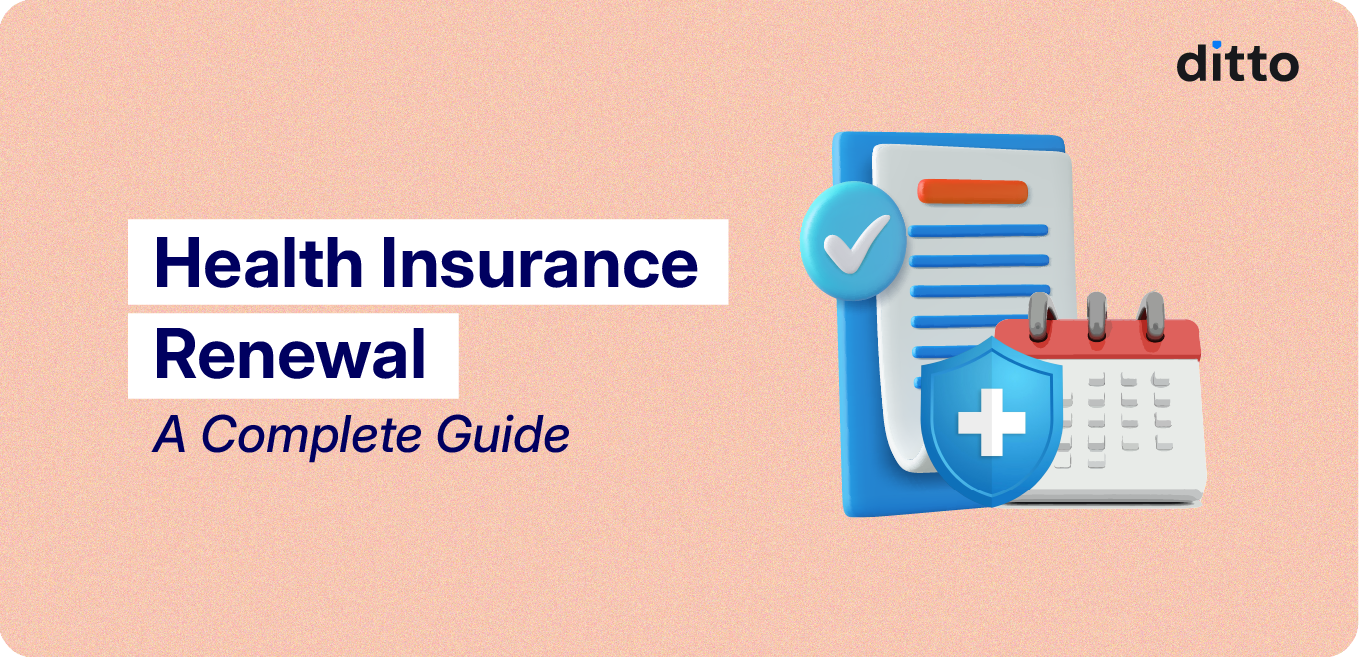Quick Overview
When you delay your health policy renewal, it can result in loss of policy benefits. At Ditto, we simplify this process to help you stay informed about renewal deadlines. This guide helps you understand the process and benefits of renewing your health policy within the given timeline.
Benefits of Renewing a Health Insurance Policy Before Expiry
Waiting Periods
No Claim Bonus
Avoids Fresh Underwriting Risk
No Coverage Gaps
How to Renew Your Health Policy within the Due Date?

If you want a quick renewal process, follow these simple steps:
- Visit your health insurer’s website and navigate to their policy renewal page.
- Enter your policy details and add any riders or make changes to the coverage if needed.
- Choose your preferred mode of payment and pay the premiums.
- Once the payment has been successful, you can download the new policy documents.
Alternatively, if you want in-person assistance for your policy renewal, visit the insurer’s nearest office branch.
Note: If you bought your health policy through Ditto, you can contact us for personal assistance.

Factors to Consider While Renewing a Health Insurance Policy
Policy Changes
When you renew your health policy, review your existing details carefully and update any changes like email, then and there.
Riders or Add-ons
While renewing your plan, you have the option to add in optional riders for critical illness or maternity benefit, if any. Review the terms and conditions of your policy and opt for the riders you need.
Network Hospitals
Check if any of the insurer’s network hospitals have been blacklisted. When you keep a note of your insurer’s current network hospitals, it ensures hassle-free cashless treatments during medical emergencies.
Did You Know?
What Happens If You Do Not Renew Your Health Insurance Policy on Time?
- Policy Continuity: If you miss the grace period, your health policy may lapse. Post which, you will have to buy a new plan, restarting all waiting periods.
- Medical Re-evaluation: For policies renewed after the grace period, your insurer may ask for a fresh medical check-up or updated health declaration before approving renewal.
- Higher Premium Possibility: If your policy has lapsed beyond the grace period, you may need to pay a higher premium (due to loadings) or face exclusions for pre-existing conditions.
- Avoid Claim Denial Risks: During the grace period, you are not eligible for benefits like cashless treatment at network hospitals. So, it’s best to renew your policy before it expires to stay covered at all times.
Note: Coverage during the grace period depends on your premium mode. If you pay in installments, coverage continues during the grace period. For non-installment renewals, coverage between expiry and payment may not be available.
How to Renew an Expired Health Insurance Policy?
If your health policy has expired, you may contact your insurer for late renewal options. If unavailable, buy a new policy to maintain continuous health coverage.
Note: Some offline insurance agents may help recover your expired plan by filling out back-dated applications, but this method is neither ethical nor legal.
Can You Transfer or Port Your Health Insurance Policy During Renewal?
Yes, you can port or transfer your health insurance policy at the time of renewal. Portability lets you switch insurers while retaining accrued benefits like waiting periods and continuity, provided you apply at least 45 days before renewal and meet the new insurer’s underwriting criteria.
Why Talk to Ditto for Your Health Insurance?
At Ditto, we’ve assisted over 8,00,000 customers with choosing the right insurance policy. Why customers like Rajan below love us:

- No-Spam & No Salesmen
- Rated 4.9/5 on Google Reviews by 15,000+ happy customers
- Backed by Zerodha
- 100% Free Consultation
You can book a FREE consultation. Slots are running out, so make sure you book a call now!
Ditto’s Take on Health Policy Renewal
If you renew your health plan on time, it keeps your coverage active and worry-free. Here’s what you can do:
- Update your contact details so you never miss important alerts.
- Set a renewal reminder a month before your renewal date and use online payments for faster and smoother renewals.
- If you want to skip the hassle of renewing every year, pick a multi-year plan.
If you are looking for a new health insurance policy with affordable coverage, we recommend comprehensive plans, which align with your long-term goals. Explore more about how our experts evaluate term plans through Ditto’s cut.
Frequently Asked Questions
Last updated on:










